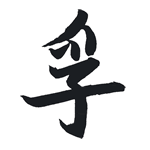
At the moment, Shikoku island is being hit by a typhoon. I've never been through any type of severe weather (save the all too common blizzards of Calgary) so this is a new experience for me. As of yet it doesn't seem to be too bad but I hear that it's supposed to pick up tonight. Expect an update when this weather passes! Now onto the subject of my post...
In Japan, three different sets of characters are used for reading and writing. They are:
1. Hiragana - solely for Japanese words
2. Katakana - for English words phonetically written into Japanese
3. Kanji - Chinese characters that are nicely mixed in with both hiragana and
katakana
Where hiragana and katakana are phonetic and relatively easy to learn, kanji is symbolic and the very devil to master. Each character's meaning needs to be memorized, however once you begin tossing different kanji together to make various words, their separate meanings almost become nil and a new meaning needs to be learned. For instance, when the characters for 'heaven' and 'messenger' are put together the new word formed is 'angel'. While the base words for angel makes some sense, other words put together are more obscure in their relationship ie, 'woman' and 'child' becomes 'like'. Though I suppose the reasoning there is all women are supposed to like children.
In addition to having to memorize about a billion combinations of kanji, the Japanese also need to learn which pronunciation to use. There is a Chinese and Japanese pronunciation for nearly every kanji. Take the kanji for 'mountain'. The Japanese word for it is 'yama' while the Chinese word is 'san'. When do you use which? I have absolutely NO IDEA. I just go around making a fool of myself by reading aloud kanji by their meanings in English. As a result the words make no sense whatsoever and I'm left more puzzled than when I started. I'm already pretty confused to begin with.
Writing a foreign language is a task unto itself. My English writing is neat and orderly if I do say so myself. My Japanese writing is probably similar to that of a young child with severe motor-skill deficiencies. I haven't even attempted kanji. There is a certain brushstroke order that is supposed to be followed when writing most Asian characters. Because I'm so fabulous I make up my own rules and as a result, my characters don't look anything like their book counterparts. I think for certain kanji you have to make as many as 23 different strokes to complete the character.
Thus, the conclusion is, I really haven't learned anything. I can read hiragana and katakana but so much kanji is used in written Japanese that any words I might've known are completely overwhelmed by it. Thus, I'm more or less illiterate, yet again in another Asian country. This has been your friendly neighbourhood post.
p.s. The Kanji shown with this post means 'truth'

No comments:
Post a Comment